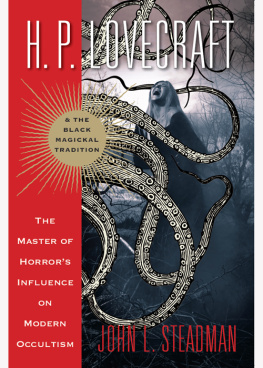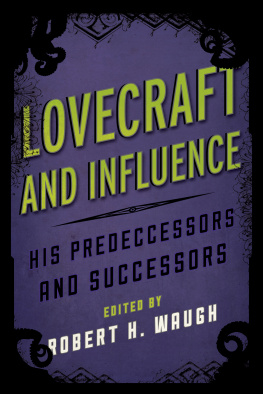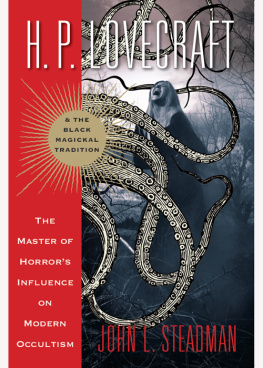Howard Lovecraft - The Unnamable
Here you can read online Howard Lovecraft - The Unnamable full text of the book (entire story) in english for free. Download pdf and epub, get meaning, cover and reviews about this ebook. genre: Science fiction. Description of the work, (preface) as well as reviews are available. Best literature library LitArk.com created for fans of good reading and offers a wide selection of genres:
Romance novel
Science fiction
Adventure
Detective
Science
History
Home and family
Prose
Art
Politics
Computer
Non-fiction
Religion
Business
Children
Humor
Choose a favorite category and find really read worthwhile books. Enjoy immersion in the world of imagination, feel the emotions of the characters or learn something new for yourself, make an fascinating discovery.

- Book:The Unnamable
- Author:
- Genre:
- Rating:3 / 5
- Favourites:Add to favourites
- Your mark:
- 60
- 1
- 2
- 3
- 4
- 5
The Unnamable: summary, description and annotation
We offer to read an annotation, description, summary or preface (depends on what the author of the book "The Unnamable" wrote himself). If you haven't found the necessary information about the book — write in the comments, we will try to find it.
The Unnamable — read online for free the complete book (whole text) full work
Below is the text of the book, divided by pages. System saving the place of the last page read, allows you to conveniently read the book "The Unnamable" online for free, without having to search again every time where you left off. Put a bookmark, and you can go to the page where you finished reading at any time.
Font size:
Interval:
Bookmark:
The Unnamable
by Howard Phillips Lovecraft
We were sitting on a dilapidated seventeenth-century tomb in the late afternoon of an autumn day at the old burying ground in Arkham, and speculating about the unnamable. Looking toward the giant willow in the cemetery, whose trunk had nearly engulfed an ancient, illegible slab, I had made a fantastic remark about the spectral and unmentionable nourishment which the colossal roots must be sucking from that hoary, charnel earth; when my friend chided me for such nonsense and told me that since no interments had occurred there for over a century, nothing could possibly exist to nourish the tree in other than an ordinary manner. Besides, he added, my constant talk about "unnamable" and "unmentionable" things was a very puerile device, quite in keeping with my lowly standing as an author. I was too fond of ending my stories with sights or sounds which paralyzed my heroes' faculties and left them without courage, words, or associations to tell what they had experienced. We know things, he said, only through our five senses or our intuitions; wherefore it is quite impossible to refer to any object or spectacle which cannot be clearly depicted by the solid definitions of fact or the correct doctrines of theology preferably those of the Congregationalist, with whatever modifications tradition and Sir Arthur Conan Doyle may supply.
With this friend, Joel Manton, I had often languidly disputed. He was principal of the East High School , born and bred in Boston and sharing New England's self-satisfied deafness to the delicate overtones of life. It was his view that only our normal, objective experiences possess any esthetic significance, and that it is the province of the artist not so much to rouse strong emotion by action, ecstasy, and astonishment, as to maintain a placid interest and appreciation by accurate, detailed transcripts of everyday affairs. Especially did he object to my preoccupation with the mystical and the unexplained; for although believing in the supernatural much more fully than I, he would not admit that it is sufficiently commonplace for literary treatment. That a mind can find its greatest pleasure in escapes from the daily treadmill, and in original and dramatic recombinations of images usually thrown by habit and fatigue into the hackneyed patterns of actual existence, was something virtually incredible to his clear, practical, and logical intellect. With him all things and feelings had fixed dimensions, properties, causes, and effects; and although he vaguely knew that the mind sometimes holds visions and sensations of far less geometrical, classifiable, and workable nature, he believed himself justified in drawing an arbitrary line and ruling out of court all that cannot be experienced and understood by the average citizen. Besides, he was almost sure that nothing can be really "unnamable." It didn't sound sensible to him.
Though I well realized the futility of imaginative and metaphysical arguments against the complacency of an orthodox sun-dweller, something in the scene of this afternoon colloquy moved me to more than usual contentiousness. The crumbling slate slabs, the patriarchal trees, and the centuried gambrel roofs of the witch-haunted old town that stretched around, all combined to rouse my spirit in defense of my work; and I was soon carrying my thrusts into the enemy's own country. It was not, indeed, difficult to begin a counter-attack, for I knew that Joel Manton actually half clung to many old-wives' superstitions which sophisticated people had long outgrown; beliefs in the appearance of dying persons at distant places, and in the impressions left by old faces on the windows through which they had gazed all their lives. To credit these whisperings of rural grandmothers, I now insisted, argued a faith in the existence of spectral substances on the earth apart from and subsequent to their material counterparts. It argued a capability of believing in phenomena beyond all normal notions; for if a dead man can transmit his visible or tangible image half across the world, or down the stretch of the centuries, how can it be absurd to suppose that deserted houses are full of queer sentient things, or that old graveyards teem with the terrible, unbodied intelligence of generations? And since spirit, in order to cause all the manifestations attributed to it, cannot be limited by any of the laws of matter, why is it extravagant to imagine psychically living dead things in shapes or absences of shapes which must for human spectators be utterly and appallingly "unnamable"? "Common sense" in reflecting on these subjects, I assured my friend with some warmth, is merely a stupid absence of imagination and mental flexibility.
Twilight had now approached, but neither of us felt any wish to cease speaking. Manton seemed unimpressed by my arguments, and eager to refute them, having that confidence in his own opinions which had doubtless caused his success as a teacher; whilst I was too sure of my ground to fear defeat. The dusk fell, and lights faintly gleamed in some of the distant windows, but we did not move. Our seat on the tomb was very comfortable, and I knew that my prosaic friend would not mind the cavernous rift in the ancient, root-disturbed brickwork close behind us, or the utter blackness of the spot brought by the intervention of a tottering, deserted seventeenth-century house between us and the nearest lighted road. There in the dark, upon that riven tomb by the deserted house, we talked on about the "unnamable" and after my friend had finished his scoffing I told him of the awful evidence behind the story at which he had scoffed the most.
My tale had been called The Attic Window, and appeared in the January, 1922, issue of Whispers. In a good many places, especially the South and the Pacific coast, they took the magazines off the stands at the complaints of silly milk-sops; but New England didn't get the thrill and merely shrugged its shoulders at my extravagance. The thing, it was averred, was biologically impossible to start with; merely another of those crazy country mutterings which Cotton Mather had been gullible enough to dump into his chaotic Magnalia Christi Americana, and so poorly authenticated that even he had not ventured to name the locality where the horror occurred. And as to the way I amplified the bare jotting of the old mystic that was quite impossible, and characteristic of a flighty and notional scribbler! Mather had indeed told of the thing as being born, but nobody but a cheap sensationalist would think of having it grow up, look into people's windows at night, and be hidden in the attic of a house, in flesh and in spirit, till someone saw it at the window centuries later and couldn't describe what it was that turned his hair gray. All this was flagrant trashiness, and my friend Manton was not slow to insist on that fact. Then I told him what I had found in an old diary kept between 1706 and 1723, unearthed among family papers not a mile from where we were sitting; that, and the certain reality of the scars on my ancestor's chest and back which the diary described. I told him, too, of the fears of others in that region, and how they were whispered down for generations; and how no mythical madness came to the boy who in 1793 entered an abandoned house to examine certain traces suspected to be there.
It had been an eldritch thing no wonder sensitive students shudder at the Puritan age in Massachusetts . So little is known of what went on beneath the surface so little, yet such a ghastly festering as it bubbles up putrescently in occasional ghoulish glimpses. The witchcraft terror is a horrible ray of light on what was stewing in men's crushed brains, but even that is a trifle. There was no beauty; no freedom we can see that from the architectural and household remains, and the poisonous sermons of the cramped divines. And inside that rusted iron straitjacket lurked gibbering hideousness, perversion, and diabolism. Here, truly, was the apotheosis of The Unnamable.
Font size:
Interval:
Bookmark:
Similar books «The Unnamable»
Look at similar books to The Unnamable. We have selected literature similar in name and meaning in the hope of providing readers with more options to find new, interesting, not yet read works.
Discussion, reviews of the book The Unnamable and just readers' own opinions. Leave your comments, write what you think about the work, its meaning or the main characters. Specify what exactly you liked and what you didn't like, and why you think so.




